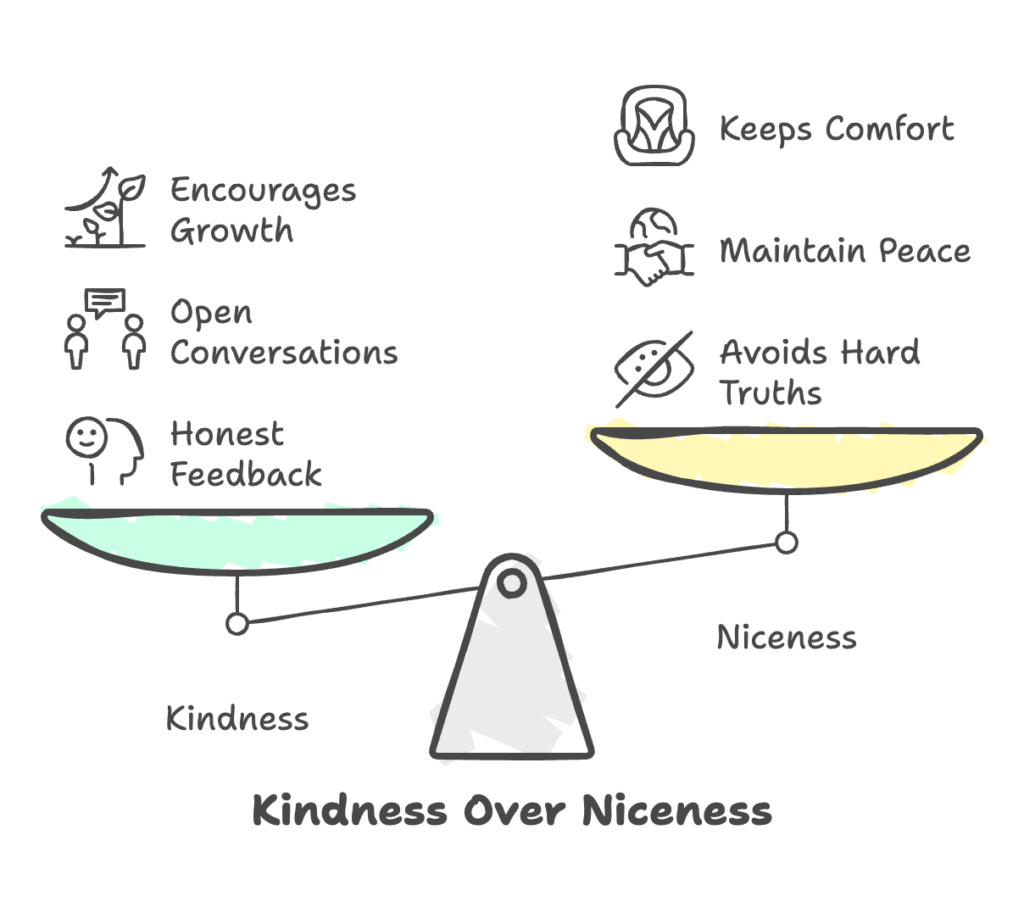In leadership and life, kindness isn’t the same as niceness.
Niceness often means avoiding hard truths to keep the peace.
Kindness, however, is built on honesty and genuine care.
It means sharing honest feedback and encouraging growth—even when uncomfortable.

Actionable Tips
1. Encourage Open, Honest Conversations
Let your team know that honest dialogue is welcome. Remind them that discussing challenges openly is how you all grow and help each other.
When your team knows that honest talk is accepted and encouraged, it can lead to deeper connections and better mutual support.
For Example: Regularly invite feedback by saying, “I want you to know I’m here for honest conversations. Your insights help me help you, and together we can solve any issue.”
This simple statement can transform your team culture by making everyone feel heard and valued.
2. Give Honest, Compassionate Feedback
Genuine kindness means giving honest and kind feedback. Don’t avoid difficult conversations just to “be nice.” Instead, share insights that help your team learn and grow. Avoid asking “why” and instead ask questions that start with “what” or “how.”
For Example: After noticing a delay on a project, you might say, “I saw that the report was late. Is there something affecting your work? How can I support you?”
This approach shows that you care about their success and are willing to help them overcome obstacles.
3. Model Authenticity and Vulnerability
Authenticity is key. You invite your team to do the same when you share your challenges and admit mistakes. This vulnerability builds trust and breaks down barriers.
For Example: (Real-life example) In my first team meeting after a reorganization, I started by saying, “I’m a little nervous about this reorganization. Change can be scary initially, and I miss my old team. But I am so excited about this growth opportunity, and I believe we can all learn and grow together.”
By showing that you’re human, too, you encourage your team to be honest about their struggles, fostering a more connected workplace.
4. Motivate and Coach Them to Grow
Learn about your team members’ strengths and weaknesses, and actively help them develop. Assign tasks that stretch their skills and build confidence.
Also, don’t shield them from challenges or over-worry about every misstep. True fulfillment and growth lie on the other side of struggles and small achievements.
For Example: If someone struggles with public speaking, encourage them to lead a small presentation. Follow up with constructive feedback and additional training resources. This will build their skills and give them a sense of fulfillment and confidence.
Conclusion
Kindness in leadership isn’t about avoiding hard truths. It’s about building a culture of authenticity, where honest feedback, clear boundaries, and vulnerability lead to genuine respect.
By welcoming open conversations, you invite your team to connect on a deeper level and support each other more effectively.
Thank you for reading!
